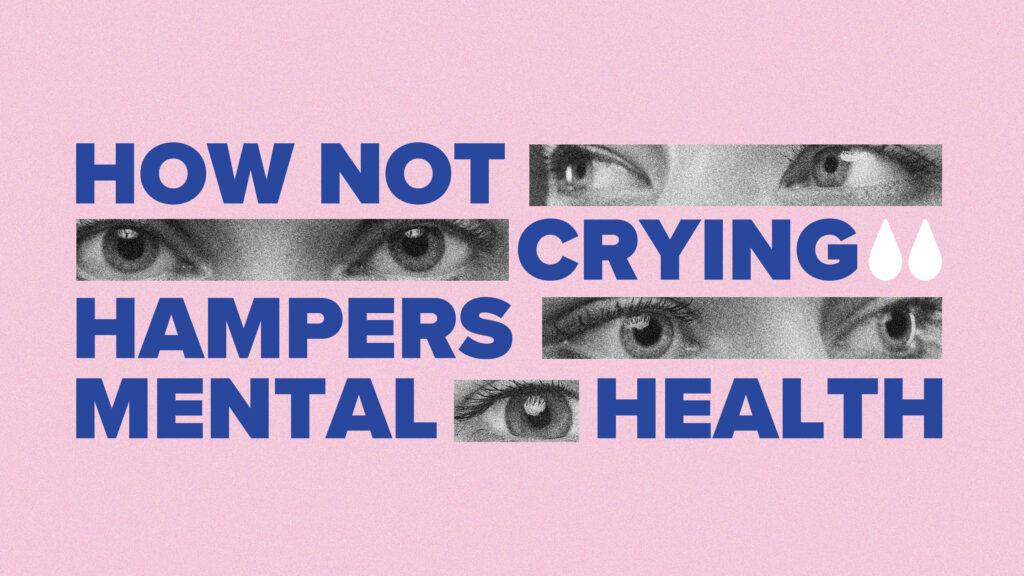“Stop crying!” “What are you a girl?” “Adults don’t cry!” “Look at that loser they’re crying!”
If you’ve taken a breath, the chances are that at some point in your life you may have heard these, or a version of these. They’re meant to shame, ridicule, and belittle someone when they’re feeling emotionally vulnerable. Society ridicules (especially a man) that cries, the underlying accusation being “only incapable people with weak emotional stamina cry”. An imaginary loss of control over our mental faculties, like a stupid, idiotic kid. Kids may not have a lot of life experience, but stupid they are not. Unhindered, unshackled are the words. Free from the unnecessary, tedious, and nonsensical constraints that adults have been brainwashed to accept. Why do we even need to cry? Is it helpful? What to do if you can’t cry? Let’s talk about it!
Why Do We Cry?
Interestingly, only human beings cry with tears as a response to emotional events. If it is that unique to our species, it must serve a purpose? Most certainly! It serves many.
- It helps clear debris from the eyes,
- It lubricates the eyes when uncomfortably dry,
- For babies it serves as an important mode of communication until they can use speech to express their needs/wants (more like demands XD),
- And finally, tears serve emotional purposes. Both, as an expression for positive and negative emotions. We cry in grief, sadness, pain, anger, jealousy, envy etc. Yet we also cry with joy, happiness, exhilaration, etc. In fact, the beauty of connection between human beings (using mirror neurons) can enable us to empathize and cry when someone we deeply care about is crying – with joy or sadness. We care so much that we cry when our loved ones cry- How wholesome is that?
What happens in our body when we cry?
Ancient philosophers from Greece and Rome also believed in the purgative powers of crying that purify us. Modern science reveals that emotional tears
- flush stress hormones and other toxins from our system,
- release oxytocin, and endorphins, which are feel-good hormones.
Essentially, emotions work through hormones. When these hormones in the body rise above a certain threshold (our bodies are so intelligent! They have an intuitive understanding of stuff like this) tears work like a beautiful mechanism that balances the biochemistry of our body. Aaaaaand we leak from our eyes.
How does it help?
Research studies show that repressive coping – the kind where we stuff our feelings down and stop ourselves from crying – can be detrimental to our mental and physical health. We become more susceptible to problems like
- less resilient immune systems,
- cardiovascular disease,
- hypertension,
- Stress,
- anxiety,
- and depression.
Crying literally releases stress and emotional pain through the mechanism we mentioned earlier. And, the feel-good hormones help us feel better. Help us cope with our pain. And when they’re tears of happiness (even sadness), crying helps us connect, empathize, and to express that we care, and love fearlessly! Win Win? Win win.
Why can’t I cry even when I want to?
Since crying is so amazing and helpful you might be wondering where you can sign up! But what if you simply…can’t? You try and try but you are unable to cry. What to do then? There are a few things to consider here.
- One is that there are individual differences in crying patterns (how often you cry, what makes you cry, how much you cry, etc.).
- Another is that there may be medical conditions that contribute to your inability to cry.
- Being mentally tired is another reason where you may find it difficult to cry (although a sign of constant and frequent crying is also a symptom of depression – it depends from case to case). The sheer inability to care or feel during depressive episodes also hamper crying. This may also occur in compassion fatigue- when we are mentally and physically too tired because of empathizing with or caring for others.
- And finally, you may find it difficult to cry because of the social stigma around crying – especially for men.
The deeply ingrained idea that men, or adults don’t cry is balderdash. It feeds the style of repressive coping where the urge to cry is suppressed either internally by shaming or berating ourself, or externally by the insensitive people around us. It robs us of one of the greatest and most fulfilling relationships we may have- the one with ourselves. Being part of a system that shames any kind of emotional expression naturally makes it difficult for some of us to even have that kind of an emotionally intimate relationship with ourselves. To help better connect with your emotions please read our blog on how to process heavy emotions!
What to do when crying it out doesn’t help?
Sometimes crying doesn’t help. Especially when we’re feeling down and out. Like when we grieve the loss of a person, a relationship, a system, or a routine. No matter how much we cry it simply doesn’t help. Everything becomes a little less. It still hurts. Life sometimes throws such curveballs at us. It is essential to seek support during these times. Emotional support from our loved ones (who no matter what our brain may think, WANT to be there for us), or professional help from psychotherapists like us! It is not easy, it is never easy, but, we are here for you.
Crying is an expression. A celebration of emotions, an emotional celebration of life. Pain, sadness, grief, joy, thrill, fear. All these emotions that guide us, protect us, and empower us. Science says crying is good for our health. That tear-jerking moment when the hero sacrifices their life for all of us? Are you kidding me, bucket loads of tears. Cry, weep, sob, whimper, lament, dear reader, for it is one of the most human things you can do. So, Why not?




